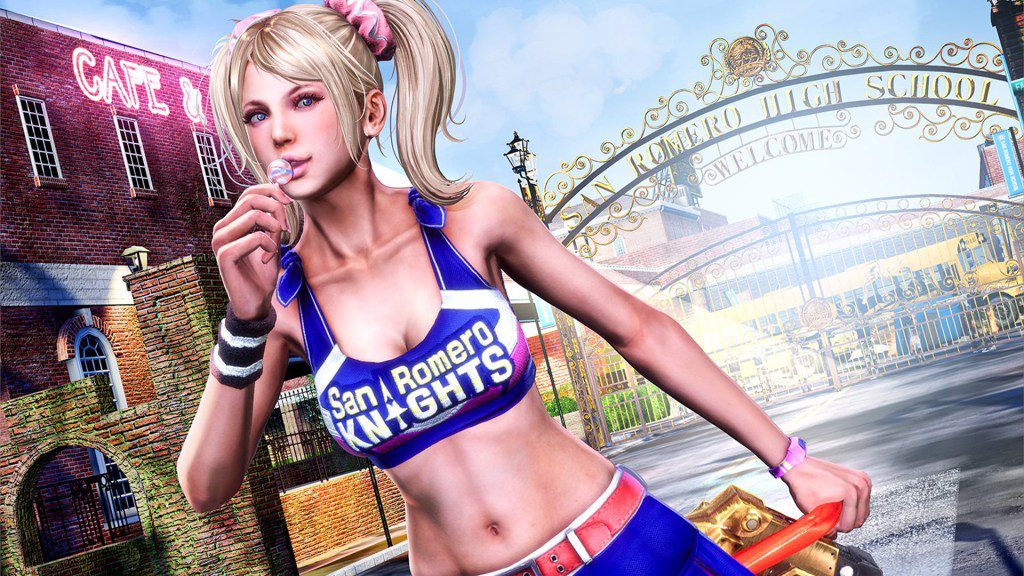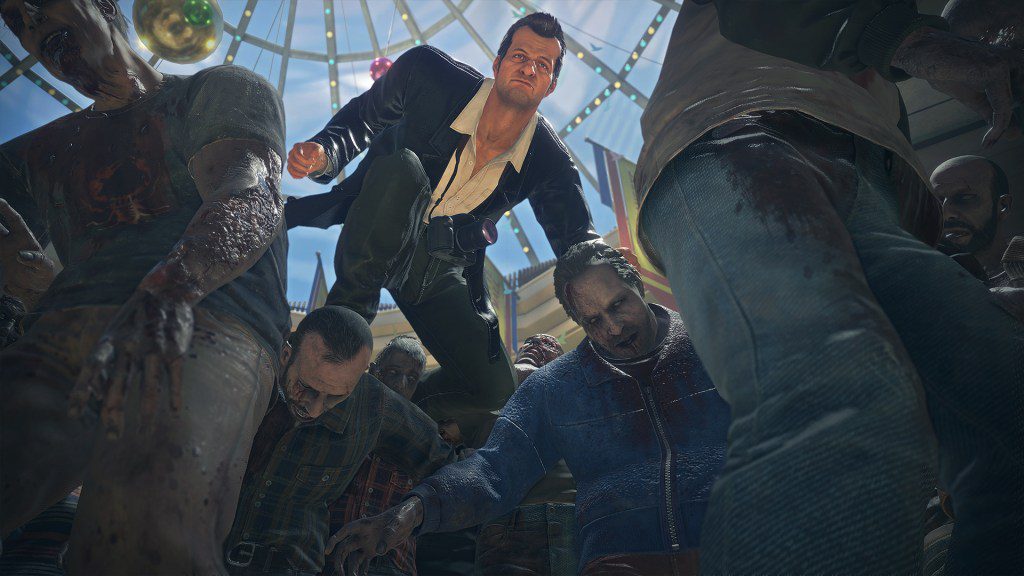‘Lollipop Chainsaw’ vs. ‘Dead Rising’: Which Controversial Zombie Game Is Better?
Two video game remasters have kicked off the Halloween season a month early, in more ways than one. Lollipop Chainsaw RePop and Dead Rising Deluxe Remaster, released on September 12 and September 19 respectively, are intriguing titles in their own merits. They’re examples of being bold about changing cultural aspects of old games and the compromises that come with fitting modern expectations.
When looking at both releases together, there’s more in common than just zombie killing. The remasters cut beyond ironing out the rough edges of decades-old games to fit modern standards. In a way, they’re the latest cautionary tales in pushing for graphical fidelity. But they’re also resurrecting conversations about outdated creative visions and game design, where the topic of censorship has developers, players, and the media at odds.
Here’s everything you need to know about Lollipop Chainsaw RePop and Dead Rising Deluxe Remaster. Were they worth remastering or better off dead, left alone as products of their time?
What are Dead Rising and Lollipop Chainsaw about?
Developed by Capcom, Dead Rising places you in the shoes of Frank West, a photojournalist who receives a scoop about a situation brewing in the fictional town of Willamette, Colorado. When he arrives, it turns out most of the population has turned into a zombie, with the remaining survivors using the local mall as a refuge.
As Frank, you have 72 hours to dissect the events that led to the zombie outbreak. This is done by tackling main objectives, rescuing survivors, and fighting the undead in time-based bursts. If you don’t get around certain tasks before the timer runs out, they’re automatically lost. The pressure around decision-making is part of the novelty, but so is how you take down zombies, using anything from benches to chainsaws from a hardware store to kill hundreds of them throughout the game.
Dead Rising was famous at the time for the technical marvel of rendering hundreds of zombies to be brutalized in inventive and playful ways. It was followed up by multiple sequels, DLCs, re-releases, and even (horrible) films.
Lollipop Chainsaw, originally released in 2012, is an action-adventure beat ‘em up developed by Grasshopper Manufacture. A collaboration between Grasshopper and now-CEO of DC Studios, filmmaker James Gunn, follows the story of student Juliet Starling as she fights zombies with a chainsaw and cheerleader pom-poms.
The presentation is pure camp, delivered with schlocky B-horror movie flair, dozens of pop culture references, and tributes to different rock genres in the form of trope-y boss fights with parodies of punks, rockabillies, and so on. The story begins with Juliet performing a ritual on her boyfriend after he’s bitten by a zombie, which involves him being decapitated and then hung on her waist as a talking head, and things escalate from there. Alongside Gunn, there were plenty of other collaborations, including illustrator “NekoshowguN” as character designer, Mindless Self Indulgence singer James Euringer (who has since been sued for sexual assault in 2021), and a long list of licensed tracks for its soundtrack, featuring artists like Arch Enemy, Joan Jett and the Blackhearts, and Dragonforce.
Unlike Dead Rising, Lollipop Chainsaw never received a sequel nor a remaster, previously available only on PS3 and Xbox 360 without a backward compatibility option to run on newer consoles. The remaster was developed by Dragami Games, a subsidiary of Kadokawa Games, without the involvement of Grasshopper nor James Gunn.
Which plays better?
In their original forms, both games could be considered uneven gameplay-wise, but the remasters improve their quality of life with some more modern mechanics.
Dead Rising Deluxe Remaster offers an optional control mode where Frank is able to move while aiming — a significant addition considering he would be vulnerable to zombies grabbing him while preparing to throw an object or shooting a gun. Autosaves prevent you from losing progress if you don’t find a safe room for long periods of time, while an improved AI for survivors makes them more competent to stay alive and follow Frank to the safe house. A few accessibility options like tweaks to subtitle sizes and reticle colors are also added on top.
The AI is better in ‘Dead Rising Deluxe Remastered,’ but escort missions are still a thing.
Capcom
When compared with 2016’s re-release, which was mostly a port with updated visuals and minor tweaks, Dead Rising Deluxe Remaster‘s changes are welcoming additions. Sure, some of the original’s punishing charm is lost with the inclusion of auto-saves — you no longer have to worry about encountering an unexpected boss fight and losing an hour of progress since your last time — and other quality-of-life improvements. But Dead Rising remains tough as nails.
Zombies are quick to grab you and chew your health down if you don’t keep your distance, the time-gated tasks are still nerve-wracking and add constant pressure, and boss encounters require adamant patience if you face them at low levels or without decent equipment. Special mention to trying to rescue three survivors, one of them requiring Frank’s shoulder to move due to an injured leg, while a gun-mounted jeep chases you around the park in the mall. There are plenty of challenges like this.

‘Lollipop Chainsaw RePop’ is still an arcade-style combo-fest.
Dragami Games, Ltd.
As for Lollipop Chainsaw RePop, the quality of life improvements are mostly adjustments and tweaks to the animations and load times. The Chained Hits Hunting system makes it so linking multiple attacks with the chainsaw will increase Juliet’s combat speed, while the Blaster now features auto-lock and auto-fire modes, as well as increased ammunition, to name a few examples. There are also new alternate weapons with gameplay effects and a Time Attack mode with an online ranking feature.
On the other end, the combo system in the original Lollipop Chainsaw, while far from matching the combat usually found in Platinum Games’ catalog — think Bayonetta (2009) or Nier: Automata (2017) — became progressively engaging the more time the player spent learning new moves for Juliet. But until you had reached that point, some encounters dragged on a bit too much. It makes sense that the team focused on ironing out those aspects. As for the overall result, it’s complicated.
Are they just products of their time?
Dead Rising had an initial remaster in 2016 that’s still available to purchase. The main appeal of the “Deluxe” Remaster is the graphical overhaul using Capcom’s proprietary RE Engine, the design toolkit that’s powered games like the Resident Evil 2 remake (2019), Street Fighter 6 (2023), and more. Seeing the mall reimagined with rich textures and lighting effects, as well as improved details for all characters — such as Frank’s painstakingly textured jacket — makes a shocking difference. More importantly, underneath the technical facelift lies the same classic experience with only a few tweaks to ease the onboarding experience for newcomers.
If this isn’t enough to draw you to a second remaster and would rather stick to an older look and feel, the 2016 version is there. In the case of Lollipop Chainsaw, however, the original game is currently unavailable on modern consoles, requiring access to a PS3 or Xbox 360 and a physical copy. There was an argument for making it available to current platforms outside of pricey second-hand resales while also ironing out some of its rough edges. Based on countless clips and feedback shared on social media and elsewhere, it’s clear only the former came to fruition.

Since launch, reports have called ‘Lollipop Chainsaw RePop’ a technical mess.
Dragami Games, Ltd
Reports of performance issues, subpar audio mixing with missing voice lines, and bugs upon bugs quickly plagued RePop‘s release. Kotaku called it a “janky mess,” based not just on the countless experiences shared by players, but on the author’s own time with the game, in which they noticed Juliet moving unnaturally fast with her attacks being slow, audio and dialogue cutting out, music disappearing, and being stuck on enemies, to name a few. Over at RePop‘s Steam discussions, the community has been compiling both general errors and defects for each of the game’s stages, trying to find workarounds to issues that would prevent them from making progress in the story, such as Juliet endlessly falling down stairs or enemies standing in place instead of attacking her.
It’s fair to say that, even if you don’t experience many of its technical issues, RePop feels like a product of its time. Noisy Pixel noted monotonous stage design, boss fights that lack challenge, and gimmicky minigames that are a chore. Yet, if you were a fan of the campy story of the original and some of its standout gameplay features, like the absurd yet engaging appeal of combining pom-pom attacks while cutting zombies in half, those are still present. The problem is that the new version can’t even match that vision — its visual presentation tones down the colorful comic-book style that made it, well, pop, and unlike Dead Rising Deluxe Remaster, the licensed songs that helped define the game’s rebellious tone are gone. Overall, the elements that made up a fundamental part of the experience aren’t present, and the overall package is riddled with issues.

The remaster has the option to minimize the gore, but doesn’t update much else.
Dragami Games, Ltd.
Dragami Games president Yoshimi Yasuda has been quite vocal about the team being aware of the bugs, periodically sharing updates on his personal X (formerly Twitter) account and encouraging players to keep reporting them. This isn’t new — after all, it was Yasuda himself who “formally” announced the remaster back in June of 2022. Since then, he’s been sharing screenshots and development updates leading to the remaster’s release, including the change in marketing jargon from a full-on remake to simply a remaster back in late 2023.
At the same time, Yasuda has been quite adamant about the fact that RePop wouldn’t be “censored,” in response to concerns around RePop mode that replaces blood with colorful effects. This, unexpectedly, has led to one-sided conversations in a similar vein to the controversies around Black Myth: Wukong and Stellar Blade earlier this year.
What exactly has been “censored”?
Comparing both releases, Dead Rising Deluxe Remaster is the one that has rather small but significant changes, altering or removing some elements altogether that would carry an outdated tone nowadays. Primarily, these involve a character model change for Larry Chiang, one of the game’s bosses (which are still called Psychopaths), with a redesign that makes him look less of a racial stereotype compared to the original, which featured Yellow Peril-related racist tropes.
There’s also the removal of the Erotica category for the scoring mechanic when you take pictures as Frank. In the original, the game would reward you for taking provocative pics of female characters, dead or alive, when underwear or cleavage were in the frame. If the picture had a high enough score, Frank’s nose would bleed to indicate sexual arousal, which is a common anime trope. In conjunction with this, some models for women have been redesigned — survivor Cheryl has a less revealing dress, for example.

‘Dead Rising’ is now a little less offensive, while retaining its core spirit.
Capcom
Other tweaks include the renaming of “Frank the Pimp” achievement to “Grateful Eight,” awarded for simultaneously escorting 8 female survivors, and “Zombie Genocider” to “Zombie Annihilator” for defeating at least 53,594 zombies. Some of the older elements are still present. In an early cutscene, Frank checks out a character’s body with a first-person camera sequence following his gaze — but all in all, Deluxe Remaster is an interesting case for modernizing a game to omit gratuitous sexualization and sensationalism. What worked 18 years ago doesn’t really fly today.
Then there’s Lollipop Chainsaw RePop. Story elements, as well as Juliet’s design, remain on par with the original. Some of the outfits featured in the previous release, mostly collaborations with franchises like Evil Dead, aren’t present, most likely due to licenses in a similar fashion to the game’s soundtrack. Others, such as “Striped Bikini” and “Sexy Seashell Bikini,” and many stereotypical fetishist costumes like the maid and nurse fits are still available to unlock. You can even get the same “I Swear! I Did It By Mistake!” achievement as the original for looking under Juliet’s skirt.
Even if there were no statements from Dragami Games that would point toward censorship, it gradually became the center of conversation for RePop‘s marketing. In July 2022, a month after the announcement, Yasuda shared a statement answering questions from fans. The last item addresses worries about censorship, with Yasuda responding that the team intended to negotiate with platform holders for the game to be “as close to the original version as possible.” He doubled down in late 2023 by further acknowledging the request and saying that there would be “uncensored” Juliet outfits to meet expectations, followed by a screenshot in May 2024 with a message about the original staff having the “same feelings about censorship as you do.”

The creator of ‘Lollipop Chainsaw’s remaster has doubled down on the culture war.
Dragami Games, Ltd.
The original international release of Lollipop Chainsaw was rated M for Mature. In Japan, the game targeted a similar rating (ages 17 and up), but some visual elements were tweaked to fit certain restrictions. These mostly involved blood splatters and gore, such as sequences that featured dismembered limbs or heads, which were covered by other objects or visual effects. A later Premium Edition obtained CERO Z rating (ages 18 and up), and brought these elements back. According to people who’ve bought this edition, the game prompts you to pick between the censored and uncensored versions after booting it up.
Neither of the original versions had differences related to Juliet’s body physics. Nonetheless, Dragami is addressing the community’s “feedback” by making tech adjustments to increase boob jiggles “The physics engine has been optimized to make Juliette’s (sic) breasts shake and other parts of her body look just like the original version,” Yasuda said on X, days after reposting a user showing the character running in the “Sexy Seashell Bikini” outfit to disprove claims.
Lollipop Chainsaw has been undergoing a cultural revision around the topic of sexism and Juliet’s portrayal since its launch. If the primary marketing push for a game that features an 18-year-old student wearing shorts, skirts, and bikinis is whether or not the team can add further physics to her body, the act of bringing Lollipop Chainsaw back to life seems unnecessary under the current circumstances. Both new and returning players are struggling with a myriad of issues that compromise the original appeal, reaching an extreme degree of rendering the game unplayable unless they follow community workarounds, all while the team is primarily focused on increasing boob physics instead.
Despite the endless soapboxing of anti-woke crusaders online, games today aren’t lacking for horniness. Games like Hades to Baldur’s Gate 3 have been celebrated for their sexy character designs and gameplay elements, especially those with diverse and queer representation that appeal to a wider spectrum of sexuality. Horniness is still a strong sales tactic — a post from PlayStation UK with the tagline “Treat yourself to 19-inches of Venom” garnered 96.1 million views on X.

As a game and a message, ‘Dead Rising’ steps into a modern cultural landscape more effectively
Capcom
In some cases, these elements are taken to an extreme, a recent example being Zenless Zone Zero’s overly horny Jane Doe. Throughout 2024, The First Descendant and Stellar Blade have brewed a fair share of discussions about jiggle physics, too. Lollipop Chainsaw RePop is merely the current target before the anti-woke mob finds a new game to take point on. Despite the game having a “Mostly Positive” rating on Steam, many reviews include comments on bugs, missing visual elements, and performance issues. Those with complaints that are nonetheless positive tend to include a line praising that, despite evidence to the contrary, the game is “uncensored” and therefore deserves a thumbs up.
Dead Rising Deluxe Remaster is an example of a revision done right, improving some of the most punishing aspects of the original while removing sexist and racial elements that are best forgotten inside an 18-year-old time capsule. Lollipop Chainsaw RePop, on the other hand, is the result of subpar efforts to re-release a cult game, worsening the experience from a visual and technical standpoint while doubling down on the most juvenile conversations from its era.
In the current state of online discourse inside our own internet echo chambers, a game’s producer directly catering to their fans misplaced outrage only legitimizes them. It gives a platform to people who aren’t interested in facts, only in going against imaginary agendas and actively targeting people. As remasters and remakes continue to come in droves, developers should be wary of the things they choose to resurrect in the process.





